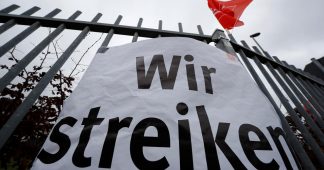The scandalous working and living conditions of workers in the German meat industry (such as Tönnies) have been criticized by trade unions for more than a decade. What happened now in this sector under conditions of the Covid-19 pandemic, see here:http://internationalviewpoint.
The super-exploitation of workers from Eastern Europe (mainly Poland, Romania, Bulgaria) in the German meat industry is also a direct effect of the EU Directive on Services in the Internal Market, the so called Bolkestein-Directive of 2006. This Directive forced member states to remove ‘obstacles’ to the free movement and provision of services within the EU. As a result of this workers from Eastern Europe worked in the German meat industry (and other sectors) as self-employed persons or in chains of subcontractors. Except the trade unions and the Left, nobody in Germany addressed that super-exploitation. German governments kept a blind eye on this.
As Eric Bonse writes below, the EU also does not seem to care about the consequences of its past legislation …
Klaus Dräger
Tönnies or the failure of “social Europe”
When it comes to the Tönnies case, the EU is even slower than the state of NRW. It is only now that Brussels is beginning to take an interest in the scandal – but action is still not forthcoming. The “social Europe” remains an empty promise.
Sarah Wiener was the first to break the silence: On Facebook, the green star cook from Austria was shocked by the conditions in the meat factory.
The system of meat production is not only unappetizing, animal-destroying and resource-destroying, but also inhuman and unjust, MEP Wiener wrote.
CDU members of parliament Pete Liese and Dennis Radtke then spoke out. Tönnies had shown that the ventilation systems of slaughterhouses were a problem. This had to be regulated EU-wide.
The underlying social problem – the systematic exploitation and “stockpiling” of temporary workers from Romania and Bulgaria – was only marginally touched upon by MEPs.
After all, EU Social Affairs Commissioner Nicolas Schmit has now made a statement on the issue. “Seasonal workers must be treated on an equal footing with all other workers”, said Schmit in an interview with “Der Spiegel”.
If they fell under the EU’s Posting of Workers Directive, their situation was clear: “Equal pay for equal work in the same place. Should this be violated, there could be infringement proceedings.
However, this is not a “threat”, as the “Spiegel” claims. For, as the paper itself writes, the case may not even fall under the Posting of Workers Directive.
And Commission President von der Leyen has so far not indicated that she is interested in the problem. She goes before the press on every little occasion, but not with Tönnies.
Neither has von der Leyen done anything so far to advance the social agenda which she inherited from her predecessor in office, Jean-Claude Juncker. On the contrary.
Under the flimsy reference to Corona, this agenda has been postponed, Social Commissioner Schmit has been slowed down. Yet Corona is crying out for social policy, as the Tönnies case shows.
When will Brussels finally take action?
It is about decent working and housing conditions, about the regulation of temporary work and subcontractors, about EU standards for minimum wages and much more.
And it is about finally treating Eastern European countries like Bulgaria or Romania as full EU members, and not as “sites” for a reserve army of cheap labour.
The Tönnies case has revealed an “antisocial EUropa” – when will Brussels finally take action?
Translated with www.DeepL.com/Translator (free version) The original post (in German) is here
Keine Schlagwörter.











